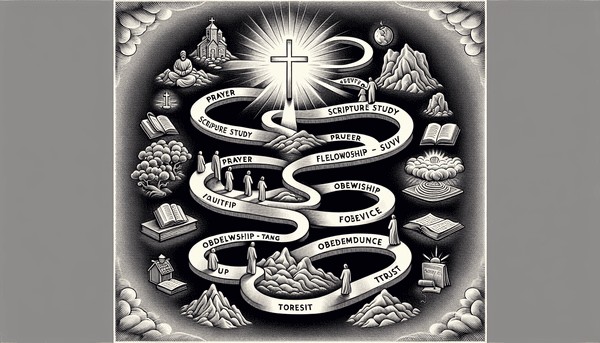Overcoming Heartbreak and Healing from a Painful Relationship
When a relationship ends, especially one that has left us deeply hurt, it can feel as if our world has shattered. The book of Psalms provides a wellspring of comfort, encouraging us to pour out our sorrows before the Lord, who is our refuge and source of strength. The Psalms teach us that it is natural to experience pain and that we should allow ourselves to grieve, as healing takes time. 'He heals the brokenhearted and binds up their wounds' (Psalm 147:3). As we navigate through this difficult period, it is essential to be patient with ourselves and lean on supportive friends and family. In our moments of prayer and reflection, we can find peace in the promise that 'Cast all your anxiety on him because he cares for you' (1 Peter 5:7), and trust that God will restore our spirit and guide us towards a hopeful future.
The Power of Forgiveness in Personal Growth
Forgiveness can be one of the most challenging virtues to practice, especially when we have been deeply wounded. The Bible, however, places a strong emphasis on the importance of forgiveness as a pathway to personal freedom and spiritual growth. Christ taught us to forgive 'not seven times, but seventy-seven times' (Matthew 18:21-22), illustrating the boundless nature of forgiveness. As we strive to forgive, it is essential to recognize that it is a personal choice and a process that may take time. Through prayer and reflection, we can ask for God's help to release the bitterness and hurt that we harbor. 'Be kind and compassionate to one another, forgiving each other, just as in Christ God forgave you' (Ephesians 4:32). By doing so, we not only free ourselves from the chains of resentment but also emulate the grace that God has shown us.
Conclusion
As we journey through life's ups and downs, the Bible remains a timeless source of wisdom and comfort. Whether we're dealing with the aftermath of a painful relationship, finding the strength to forgive those who have wronged us, or seeking to build unity in the face of division, scripture offers guidance and reassurance. In embracing these teachings, we can find peace, experience personal growth, and nurture harmonious relationships. Let us carry these lessons with us, allowing the light of faith to illuminate our path toward healing, forgiveness, and community.
FAQ
Q: Where in the Bible does it tell us to let go and let God?
A: The phrase 'let go and let God' is not explicitly stated in the Bible, but its concept is reflected in verses like 1 Peter 5:7, which says, 'Cast all your anxiety on him because he cares for you,' and Philippians 4:6-7, which encourages us to present our requests to God and find peace in His presence.
Q: How do I learn how to forgive people who hurt me?
A: Forgiveness is a process, and the Bible provides guidance on this topic. Verses like Ephesians 4:32, which says 'Be kind and compassionate to one another, forgiving each other, just as in Christ God forgave you,' teach us to emulate God's forgiveness. It is a journey of letting go of bitterness through prayer, reflection, and understanding others' perspectives.
Q: Blessed are those who hunger for righteousness; where can I find this in the Bible?
A: This beatitude is found in Matthew 5:6, which says, 'Blessed are those who hunger and thirst for righteousness, for they will be filled.' It is part of Jesus' Sermon on the Mount, where He describes the qualities that lead to a blessed life.
Q: How can I foster unity in my community?
A: The Bible encourages believers to live in harmony and peace with one another. Romans 12:18 advises, 'If it is possible, as far as it depends on you, live at peace with everyone.' Building unity involves active listening, empathy, and mutual respect for each other's differences, as well as recognizing the value of each person within the community.






